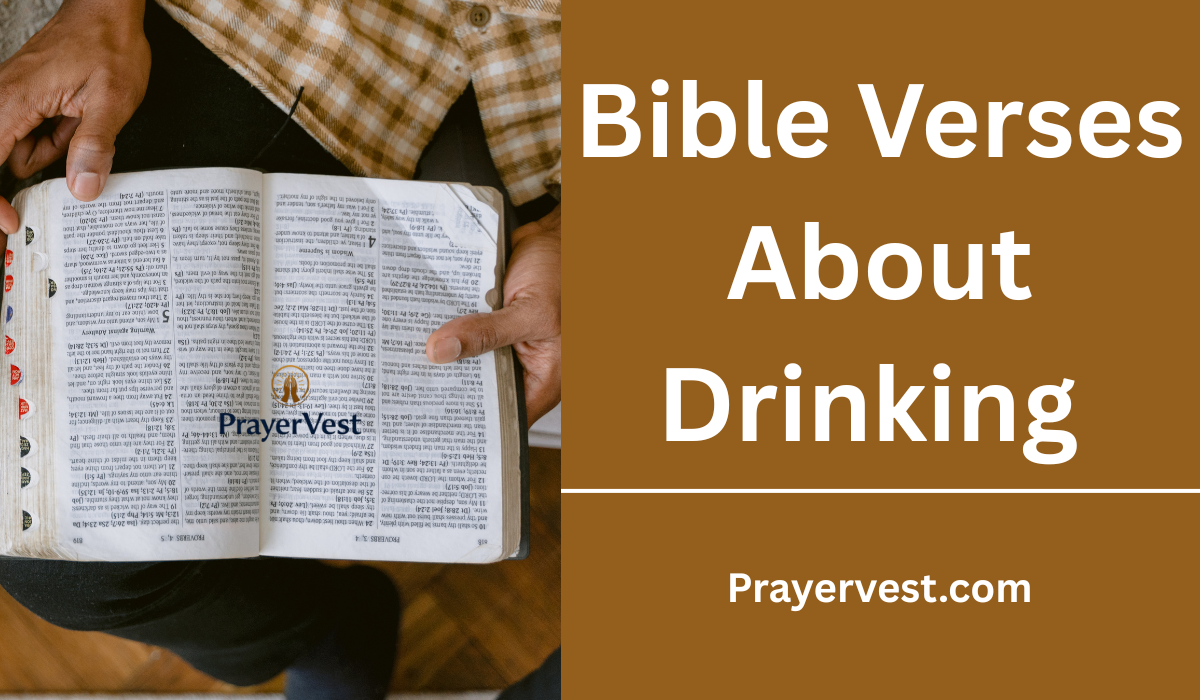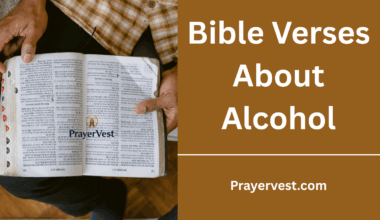The Bible discusses drinking in a very balanced and clear manner. Scripture offers specific instructions on moderation, prudence, and self-control, but it does not explicitly condemn the use of wine or alcohol.
In the biblical story, drinking is frequently linked to festivities, camaraderie, and even blessings, yet excessive consumption and intoxication are constantly discouraged. Christians can make decisions that honor God and safeguard their mental, physical, and spiritual well-being by knowing what the Bible says about alcohol.
Wine appears throughout the Bible as a test as well as a sign of gladness. For instance, wine is said to “gladden the heart” in the Psalms, yet if misused, Proverbs cautions that it can also result in conflict, bad judgment, and destruction. We learn from this difference that drinking is not always evil but rather calls for discernment.
The Bible’s teachings demonstrate that how we respond to alcohol—whether with thankfulness and self-control or carelessness and decadence—is more important than the beverage itself.


Biblical wisdom is more important than ever in a world where drinking is publicly glorified but also causes addiction and brokenness. Christians are expected to maintain their bodies as temples of the Holy Spirit, to be sober-minded, and to abstain from anything that could lead people astray. We can learn how to strike a balance between freedom and responsibility, joy and prudence, and personal liberty and love for others by considering Bible scriptures about drinking.
40 Powerful Bible Verses About Drinking (2026)
1. Proverbs 20:1
“Wine is a mocker and beer a brawler; whoever is led astray by them is not wise.”
This verse gives a clear warning about the dangers of alcohol. While wine and strong drink were part of ancient life, they were never meant to control or destroy. The proverb teaches that those who let alcohol rule their actions lose their wisdom and often fall into conflict. For grandparents, parents, or the younger generation, the reminder is timeless: self-control is better than indulgence, and wisdom is better than temporary pleasure.
2. Ephesians 5:18
“Do not get drunk on wine, which leads to debauchery. Instead, be filled with the Spirit.”
Paul contrasts two forms of influence—being under the control of alcohol versus being filled with the Holy Spirit. Drunkenness clouds judgment and leads to reckless behavior, while the Spirit produces clarity, peace, and godly living. This verse encourages Christians to choose spiritual fullness over worldly excess, reminding us that true joy and satisfaction come from God, not a drink.
3. Proverbs 23:20-21
“Do not join those who drink too much wine or gorge themselves on meat, for drunkards and gluttons become poor, and drowsiness clothes them in rags.”
Here, the Bible links overindulgence in food and drink with poverty and ruin. The passage shows that unchecked desires weaken discipline, leading to both physical and spiritual decline. Grandparents, parents, and leaders can model restraint, teaching younger generations that moderation leads to prosperity, while excess brings unnecessary hardship.
4. Isaiah 5:11
“Woe to those who rise early in the morning to run after their drinks, who stay up late at night till they are inflamed with wine.”
Isaiah pronounces a strong warning against addiction and dependency on alcohol. Those who chase after drink make it the center of their lives, neglecting their responsibilities and distancing themselves from God. This verse calls believers to live with balance and purpose, reminding us that true fulfillment is found in the Lord, not in numbing distractions.
5. 1 Timothy 5:23
“Stop drinking only water, and use a little wine because of your stomach and your frequent illnesses.”
Paul’s advice to Timothy shows that wine was not forbidden, but intended to be used wisely. Here, wine is prescribed for medicinal purposes, highlighting moderation and purposefulness rather than indulgence. It demonstrates that drinking in itself is not a sin but must be approached with discernment, care, and responsibility.
6. Habakkuk 2:15
“Woe to him who gives drink to his neighbors, pouring it from the wineskin till they are drunk, so that he can gaze on their naked bodies!”
This verse condemns using alcohol to manipulate or exploit others. Forcing or encouraging drunkenness for personal gain is a grave sin. It shows that alcohol misuse doesn’t just harm the drinker but can also be weaponized against others. God warns that those who misuse it in this way will face judgment, reminding us of the seriousness of protecting others from harm.
7. Proverbs 23:29-30
“Who has woe? Who has sorrow? Who has strife? Who has complaints? Who has needless bruises? Who has bloodshot eyes? Those who linger over wine, who go to sample bowls of mixed wine.”
This vivid description outlines the painful consequences of excessive drinking—sorrow, conflict, and even physical harm. Rather than promising joy, overindulgence often brings regret and brokenness. The passage reminds us that lasting peace and joy come from God, not from temporary escapes found in excess.
8. Romans 13:13
“Let us behave decently, as in the daytime, not in carousing and drunkenness, not in sexual immorality and debauchery, not in dissension and jealousy.”
Paul calls Christians to live with integrity and decency, avoiding behaviors that dishonor God and harm others. Drunkenness is grouped with immorality and strife, showing its potential to lead us into sin. This verse reminds us that believers should live in such a way that their conduct reflects Christ’s light in both public and private life.
9. 1 Corinthians 6:10
“…nor thieves nor the greedy nor drunkards nor slanderers nor swindlers will inherit the kingdom of God.”
Here, drunkenness is listed alongside other destructive sins that separate people from God’s kingdom. It reveals that when alcohol dominates a person’s life, it can lead them into lifestyles that reject God’s authority. Yet the surrounding verses also remind us of hope—through Christ, believers can be washed, sanctified, and set free from destructive habits.
10. Luke 21:34
“Be careful, or your hearts will be weighed down with carousing, drunkenness and the anxieties of life, and that day will close on you suddenly like a trap.”
Jesus warns against being spiritually unprepared because of worldly distractions like drunkenness and worry. When hearts are dulled by excess, vigilance is lost. This verse calls believers to stay alert and sober-minded, living with eternity in view rather than being consumed by temporary indulgences.
11. Proverbs 31:4-5
“It is not for kings, Lemuel—it is not for kings to drink wine, not for rulers to crave beer, lest they drink and forget what has been decreed, and deprive all the oppressed of their rights.”
This passage warns leaders against heavy drinking, showing that it can cloud judgment and harm those under their care. Grandparents, parents, and leaders in any capacity are reminded of the responsibility that comes with influence. Sobriety and clarity are essential to protect and serve others faithfully.
12. 1 Peter 4:3
“For you have spent enough time in the past doing what pagans choose to do—living in debauchery, lust, drunkenness, orgies, carousing and detestable idolatry.”
Peter encourages believers to leave behind their old lifestyles, which often included drunkenness and reckless living. He calls them to live differently, with holiness and purpose. This verse reminds us that following Christ means transformation, where past excess is replaced with godly discipline and joy.
13. Isaiah 28:7
“And these also stagger from wine and reel from beer: Priests and prophets stagger from beer and are befuddled with wine; they reel from beer, they stagger when seeing visions, they stumble when rendering decisions.”
This verse shows the devastating effect of alcohol on spiritual leaders in Israel. Drunkenness not only impaired their judgment but also corrupted their ministry. It stands as a warning for all who lead—whether in family, church, or community—that alcohol misuse can erode credibility and weaken spiritual discernment.
14. Galatians 5:19-21
“The acts of the flesh are obvious: sexual immorality, impurity and debauchery; idolatry and witchcraft; hatred, discord… drunkenness, orgies, and the like. I warn you, as I did before, that those who live like this will not inherit the kingdom of God.”
Drunkenness is identified here as part of the “acts of the flesh,” contrasting sharply with the fruit of the Spirit. It’s not merely a habit but a spiritual battle—an indulgence that distances people from God’s kingdom. Paul calls believers to crucify the flesh and instead walk in the Spirit, who brings true freedom and self-control.
15. Hosea 4:11
“To prostitution, old wine and new wine take away their understanding.”
This verse highlights how indulgence in wine can cloud judgment and weaken moral clarity. It is grouped alongside unfaithfulness, showing that drunkenness often opens the door to further sin. God calls His people to live with clear minds and faithful hearts, resisting anything that blinds them to truth.
16. Proverbs 23:20-21
“Do not join those who drink too much wine or gorge themselves on meat, for drunkards and gluttons become poor, and drowsiness clothes them in rags.”
This proverb connects overindulgence in food and drink with poverty and ruin. It warns that lack of self-control leads not only to physical harm but also to financial and social decline. God’s wisdom reminds us that discipline brings stability, while excess opens the door to destruction.
17. Titus 2:3
“Likewise, teach the older women to be reverent in the way they live, not to be slanderers or addicted to much wine, but to teach what is good.”
Paul emphasizes that godly living requires self-control, even in the use of wine. Addiction diminishes a believer’s ability to teach and influence others positively. Instead, God calls His people to model reverence, wisdom, and balance—showing others how to live in a way that glorifies Him.
18. Isaiah 5:11
“Woe to those who rise early in the morning to run after their drinks, who stay up late at night till they are inflamed with wine.”
This verse addresses those who are enslaved by drinking habits, living in constant pursuit of intoxication. It reveals how alcohol can dominate a life, consuming time, energy, and focus. God’s warning is clear: a life controlled by drink will only lead to emptiness and judgment.
19. Proverbs 20:1
“Wine is a mocker, strong drink is raging: and whosoever is deceived thereby is not wise.”
This well-known proverb personifies wine as a deceiver and strong drink as uncontrollable. Those who are misled by its false promises of joy and courage lack wisdom. Instead of relying on substances, the wise place their trust in God, who gives strength without regret.
20. Ephesians 5:18
“Do not get drunk on wine, which leads to debauchery. Instead, be filled with the Spirit.”
Paul contrasts drunkenness with being Spirit-filled. While alcohol can dull the mind and lead to reckless behavior, the Holy Spirit brings clarity, peace, and godly direction. This verse calls believers to choose lasting joy and guidance from God’s Spirit rather than fleeting satisfaction in drink.
21. Leviticus 10:9
“You and your sons are not to drink wine or other fermented drink whenever you go into the tent of meeting, or you will die. This is a lasting ordinance for the generations to come.”
God commanded priests to remain sober when entering His presence, showing the seriousness of worship and service. Sobriety ensured they could minister with reverence and clarity. This serves as a reminder that when we approach God, whether in prayer or service, our hearts and minds must be fully devoted to Him.
22. Micah 2:11
“If a liar and deceiver comes and says, ‘I will prophesy for you plenty of wine and beer,’ that would be just the prophet for this people!”
Micah rebukes false prophets who promised indulgence instead of truth. This verse illustrates how alcohol can be used as a lure for deceit and false comfort. God warns His people not to be led astray by voices that encourage sin rather than faithfulness.
23. Daniel 1:8
“But Daniel resolved not to defile himself with the royal food and wine, and he asked the chief official for permission not to defile himself this way.”
Daniel chose not to partake of the king’s wine, showing his commitment to holiness and self-discipline. His example reveals that sometimes abstinence is the best way to maintain spiritual integrity. By honoring God with his choices, Daniel was blessed with wisdom, favor, and strength.
24. 1 Thessalonians 5:6-7
“So then, let us not be like others, who are asleep, but let us be awake and sober. For those who sleep, sleep at night, and those who get drunk, get drunk at night.”
Paul encourages believers to live alert and sober lives, fully aware of Christ’s coming. Drunkenness is associated with spiritual sleep, while sobriety is linked with readiness. Christians are called to live in the light, avoiding the traps of darkness that intoxication often brings.
25. Deuteronomy 29:19-20
“When such a person hears the words of this oath and they invoke a blessing on themselves, thinking, ‘I will be safe, even though I persist in going my own way,’ they will bring disaster on the watered land as well as the dry. The Lord will never be willing to forgive them; his wrath and zeal will burn against them.”
While not directly about alcohol alone, this passage warns against presuming safety while persisting in sin, which can include drunkenness. It reveals the danger of stubbornly clinging to destructive habits while believing there will be no consequence. God calls for repentance and obedience, not excuses.
26. Proverbs 23:29-30
“Who has woe? Who has sorrow? Who has strife? Who has complaints? Who has needless bruises? Who has bloodshot eyes? Those who linger over wine, who go to sample bowls of mixed wine.”
This vivid proverb paints a picture of the misery caused by excessive drinking. Far from bringing joy, it leads to sorrow, conflict, and regret. The passage cautions us to weigh the consequences of overindulgence against the fleeting pleasure it offers.
27. Romans 13:13
“Let us behave decently, as in the daytime, not in carousing and drunkenness, not in sexual immorality and debauchery, not in dissension and jealousy.”
Paul calls believers to live in the light, free from behaviors that thrive in secrecy and sin. Drunkenness is linked with immorality and division, while sobriety fosters unity and holiness. This verse reminds us that our actions reflect our identity in Christ.
28. Isaiah 28:7
“And these also stagger from wine and reel from beer: priests and prophets stagger from beer and are befuddled with wine; they reel from beer, they stagger when seeing visions, they stumble when rendering decisions.”
Here, even spiritual leaders are shown stumbling due to drunkenness, leading to failed judgment and misguidance. Alcohol clouds discernment and can discredit one’s calling. God warns His people that leadership demands sobriety and integrity.
29. Luke 21:34
“Be careful, or your hearts will be weighed down with carousing, drunkenness and the anxieties of life, and that day will close on you suddenly like a trap.”
Jesus warns against the distractions of drunkenness and worldly cares, which can blind us to His return. Sobriety is tied to spiritual readiness, ensuring we remain watchful and prepared. This verse calls us to live with eternity in view.
30. Joel 1:5
“Wake up, you drunkards, and weep! Wail, all you drinkers of wine; wail because of the new wine, for it has been snatched from your lips.”
Joel’s call to drunkards to wake up is both literal and spiritual. Their reliance on wine has left them vulnerable to loss and judgment. God uses this imagery to urge His people to repent and return to Him rather than depend on fleeting indulgence.
31. 1 Peter 4:3
“For you have spent enough time in the past doing what pagans choose to do—living in debauchery, lust, drunkenness, orgies, carousing and detestable idolatry.”
Peter reminds believers that they have already wasted enough of their past in sinful living. Drunkenness is listed among practices that pull people away from God. The call here is to embrace a new life in Christ, free from destructive habits.
32. Isaiah 24:9
“No longer do they drink wine with a song; the beer is bitter to its drinkers.”
This verse shows how what was once a source of joy becomes bitter in times of God’s judgment. Alcohol, often linked with celebration, loses its sweetness when hearts are far from God. True joy comes not from wine but from God’s presence.
33. Genesis 9:21
“When he drank some of its wine, he became drunk and lay uncovered inside his tent.”
This verse recounts Noah’s drunkenness after the flood, which led to shame and dishonor. Even a righteous man can stumble through indulgence. The story warns of the vulnerability and loss of dignity that come with drunkenness.
34. Isaiah 56:12
“Come,” each one cries, “let me get wine! Let us drink our fill of beer! And tomorrow will be like today, or even far better.”
This verse exposes the empty promises of those who live for indulgence. They expect tomorrow to be as carefree as today, ignoring the reality of God’s coming judgment. It’s a sobering reminder that life is fragile, and recklessness has consequences.
35. Luke 7:33-34
“For John the Baptist came neither eating bread nor drinking wine, and you say, ‘He has a demon.’ The Son of Man came eating and drinking, and you say, ‘Here is a glutton and a drunkard, a friend of tax collectors and sinners.’”
Jesus highlights the hypocrisy of His critics. John practiced abstinence, while Jesus joined meals to reach the lost, yet both were condemned. The lesson is that judgment should not be based on appearances but on God’s truth and mission.
36. Psalm 107:27
“They reeled and staggered like drunkards; they were at their wits’ end.”
The psalmist describes those tossed by life’s storms as staggering like drunkards, symbolizing helplessness. Just as intoxication leaves one disoriented, so do trials without God’s intervention. This imagery calls us to rely on the Lord for stability.
37. Hosea 4:11
“To prostitution, old wine and new wine take away their understanding.”
God condemns Israel for turning to sin and indulgence, which clouded their judgment. Wine here is symbolic of influences that steal wisdom and discernment. The verse warns believers that unchecked indulgence can lead to spiritual blindness.
38. Galatians 5:19-21
“The acts of the flesh are obvious: sexual immorality, impurity and debauchery; idolatry and witchcraft; hatred, discord, jealousy, fits of rage, selfish ambition, dissensions, factions and envy; drunkenness, orgies, and the like. I warn you, as I did before, that those who live like this will not inherit the kingdom of God.”
Paul categorizes drunkenness among the works of the flesh that separate people from God’s kingdom. This strong warning underscores the seriousness of allowing alcohol to rule one’s life. Instead, believers are called to walk by the Spirit and bear good fruit.
39. Revelation 17:2
“With her the kings of the earth committed adultery, and the inhabitants of the earth were intoxicated with the wine of her adulteries.”
In Revelation, wine is symbolic of spiritual corruption and seduction. The nations are pictured as intoxicated by sin and false religion. This verse shows how spiritual drunkenness leads to widespread rebellion against God.
40. Habakkuk 2:15
“Woe to him who gives drink to his neighbors, pouring it from the wineskin till they are drunk, so that he can gaze on their naked bodies!”
This verse condemns not just drinking but also causing others to stumble through it. Exploiting someone’s weakness for selfish gain is a grave sin in God’s eyes. It reminds us of our responsibility not only for our own actions but also for how we influence others.
Conclusion
In summary, the Bible presents a fair assessment of alcohol consumption, reminding us that although wine and alcohol are safe to consume in moderation, they may also be harmful if abused. Scripture continuously exhorts prudence, self-control, and thankfulness while cautioning against intoxication, recklessness, and decisions that result in disaster. The heart and the discipline with which it is handled are more important than just what is consumed.
Living a life that honors God, respects the body as His temple, and loves others enough to not be a hindrance is the call for believers. Like many other liberties, drinking needs to be controlled by discernment and an understanding of its effects on relationships, emotions, and spirituality. We can live responsibly and peacefully while making decisions that represent Christ by firmly establishing ourselves in biblical values.






